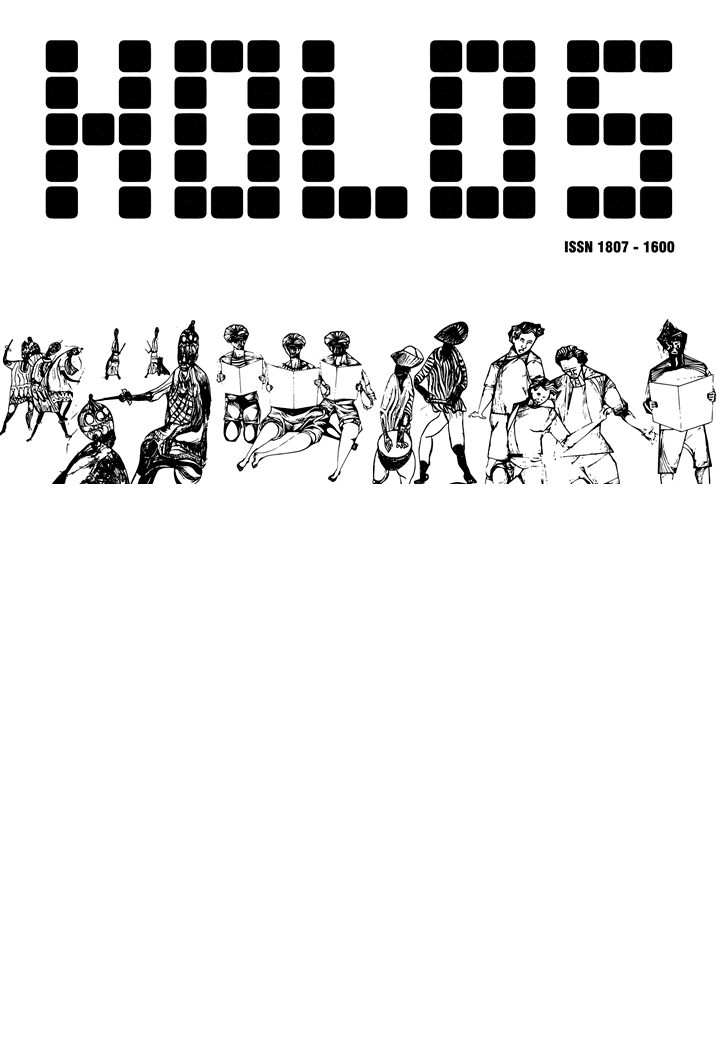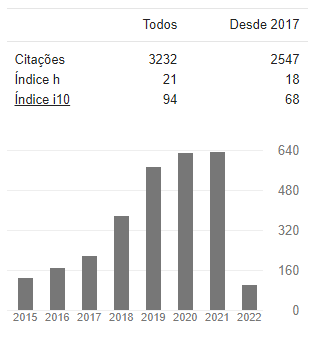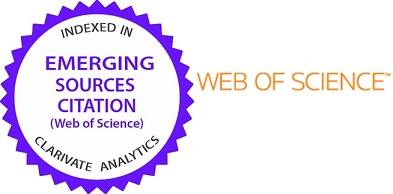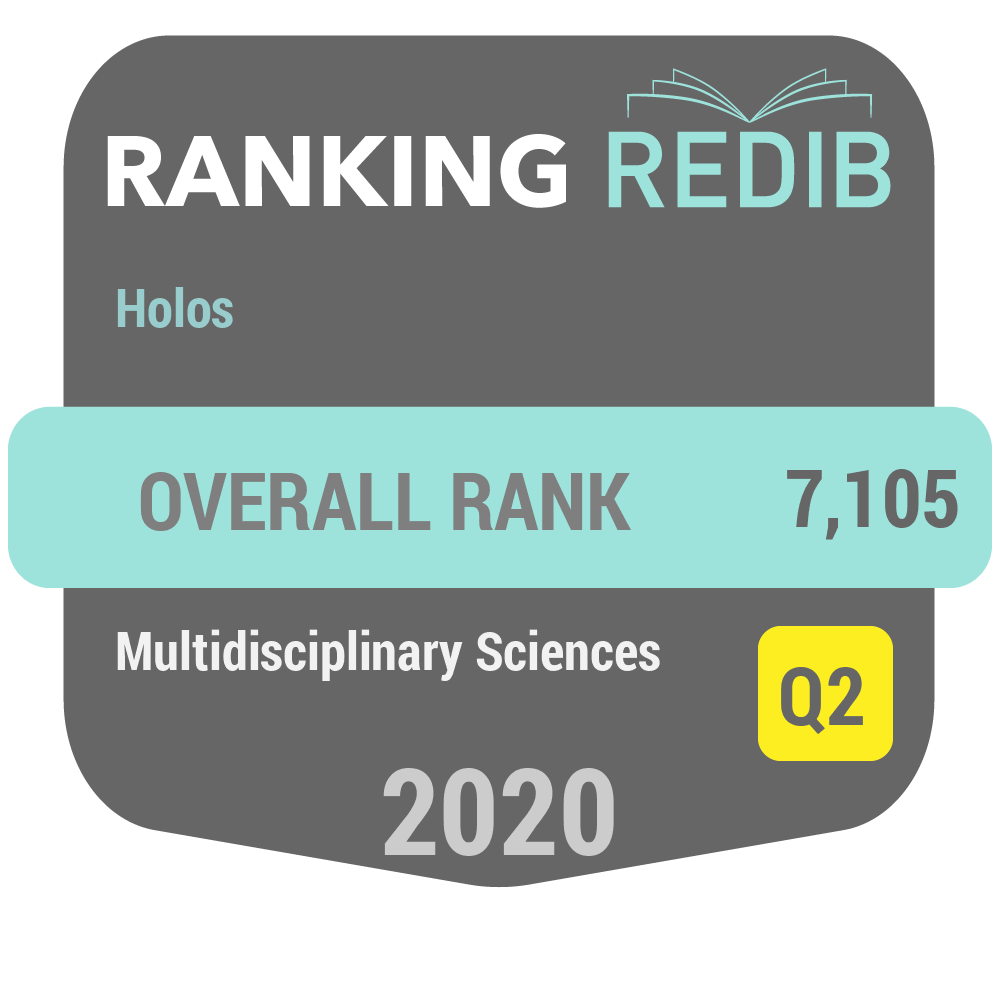RELATIONSHIP BETWEEN CYBER PLAGIARISM AND THE BIG FIVE PERSONALITY TRAITS: AN EMPIRICAL STUDY IN A CHILEAN UNIVERSITY
DOI:
https://doi.org/10.15628/holos.2017.5191Palavras-chave:
Plagiarism, Big five model, Latin America, Partial least squaresResumo
The relationship between cyber plagiarism and the big five personality traits was explored in a sample of Chilean undergraduate students (N=106). A questionnaire based on 44 items was used to measure the respondents’ big five personality traits. In addition, a three-item scale was adopted to measure self-report on the behaviour of cyber plagiarism. The technique of partial least squares regression was used for data analysis. The results indicate that an increase in cyber plagiarism (R2=.22) is significant and negatively related to the personality traits of conscientiousness, extraversion, and openness to experience, as also significant and positively related to the personality trait of neuroticism.
Downloads
Referências
AKOMOLAFE, M. J. Personality Characteristics as Predictors of Academic Performance of Secondary School Students. Mediterranean Journal of Social Sciences, v. 4, n. 2, p. 657, 2013.
BONITO, J. C. La universidad Latinoamericana en la encrucijada: amenazas, desafíos y soluciones. Revista Historia de la Educación Latinoamericana, v. 18, n. 26, p. 241-277, 2016.
BRATTON, V. K.; STRITTMATTER, C. To Cheat or Not to Cheat?: The Role of Personality in Academic and Business Ethics. Ethics & Behavior, v. 23, n. 6, p. 427-444, Nov 2013.
CENFETELLI, R. T.; BASSELLIER, G. Interpretation of formative measurement in information systems research. Mis Quarterly, v. 33, n. 4, p. 689-707, 2009.
CHIN, W. W. The partial least squares approach for structural equation modeling. In: MARCOULIDES, G. A. (Ed.). Modern Methods for Business Research. Hillsdale, NJ: Lawrence Erlbaum Associates, 1998. p.295-336.
DE FEYTER, T. et al. Unraveling the impact of the Big Five personality traits on academic performance: The moderating and mediating effects of self-efficacy and academic motivation. Learning and Individual Differences, v. 22, n. 4, p. 439-448, 2012.
DERBY, B. Duplication and plagiarism increasing among students. Nature, v. 452, n. 7183, p. 29-29, 2008.
EVANS, A. M.; REVELLE, W. Survey and behavioral measurements of interpersonal trust. Journal of Research in Personality, v. 42, n. 6, p. 1585-1593, 2008.
FORNELL, C.; LARCKER, D. F. Evaluating Structural Equation Models with Unobservable Variables and Measurement Error. v. 18, n. 1, p. 39-50, 1981.
GILUK, T. L.; POSTLETHWAITE, B. E. Big Five personality and academic dishonesty: A meta-analytic review. Personality and Individual Differences, v. 72, p. 59-67, 2015.
GOLDBERG, L. R. An alternative description of personality - The big-5 factor structure. Journal of Personality and Social Psychology, v. 59, n. 6, p. 1216-1229, Dec 1990.
HAIR JR, J. F.; ANDERSON, R. E.; TATHAM, R. L. Multivariate data analysis with readings. New York, NY: Macmillan Publishing Co., Inc., 1986.
JOHN, O. P.; SRIVASTAVA, S. The Big Five trait taxonomy: History, measurement, and theoretical perspectives. Handbook of personality: Theory and research, v. 2, n. 1999, p. 102-138, 1999.
KARIM, N. S. A.; ZAMZURI, N. H. A.; NOR, Y. M. Exploring the relationship between Internet ethics in university students and the big five model of personality. Computers & Education, v. 53, n. 1, p. 86-93, Aug 2009.
KOCK, N. WarpPLS 5.0 user manual. Laredo, TX: ScriptWarp Systems, 2015.
MARK, G.; GANZACH, Y. Personality and Internet usage: A large-scale representative study of young adults. Computers in Human Behavior, v. 36, p. 274-281, Jul 2014.
MATZLER, K.; MUELLER, J. Antecedents of knowledge sharing - Examining the influence of learning and performance orientation. Journal of Economic Psychology, v. 32, n. 3, p. 317-329, Jun 2011.
MATZLER, K.; RENZL, B. Personality traits, employee satisfaction and affective commitment. Total Quality Management & Business Excellence, v. 18, n. 5, p. 589-598, 2007.
MATZLER, K. et al. Personality traits and knowledge sharing. Journal of Economic Psychology, v. 29, n. 3, p. 301-313, Jun 2008.
OLIPHANT, T. Cyber-plagiarism: Plagiarism in a digital world. Feliciter, v. 48, n. 2, p. 78-80, 2002.
ORZECK, T.; LUNG, E. Big-five personality differences of cheaters and non-cheaters. Current Psychology, v. 24, n. 4, p. 274-286, Win 2005.
O’CONNOR, M. C.; PAUNONEN, S. V. Big Five personality predictors of post-secondary academic performance. Personality and Individual differences, v. 43, n. 5, p. 971-990, 2007.
RAMÍREZ BACCA, R.; JIMÉNEZ PATIÑO, H. D. Plagiarism and Self-plagiarism. A Reflexion. HiSTOReLo. Revista de Historia Regional y Local, v. 8, n. 16, p. 273-283, 2016.
ROIG, M.; DETOMMASO, L. Are college cheating and plagiarism related to academic procrastination? Psychological Reports, v. 77, n. 2, p. 691-698, 1995.
TENENHAUS, M. et al. PLS path modeling. Computational Statistics & Data Analysis, v. 48, n. 1, p. 159-205, Jan 2005.
TRUSHELL, J.; BYRNE, K.; SIMPSON, R. Cheating behaviours, the Internet and Education undergraduate students. Journal of Computer Assisted Learning, v. 28, n. 2, p. 136-145, Apr 2012.
UNDERWOOD, J.; SZABO, A. Academic offences and e-learning: individual propensities in cheating. British Journal of Educational Technology, v. 34, n. 4, p. 467-477, Sep 2003.
VASCONCELOS, S. et al. Discussing plagiarism in Latin American science. EMBO reports, v. 10, n. 7, p. 677-682, 2009.
WILKS, D. C.; CRUZ, J. N.; SOUSA, P. Personality Traits and Plagiarism: an Empirical Study with Portuguese Undergraduate Students. Journal of Academic Ethics, v. 14, n. 3, p. 231-241, 2016.
WILLIAMS, K. M.; NATHANSON, C.; PAULHUS, D. L. Identifying and Profiling Scholastic Cheaters: Their Personality, Cognitive Ability, and Motivation. Journal of Experimental Psychology-Applied, v. 16, n. 3, p. 293-307, Sep 2010.









































